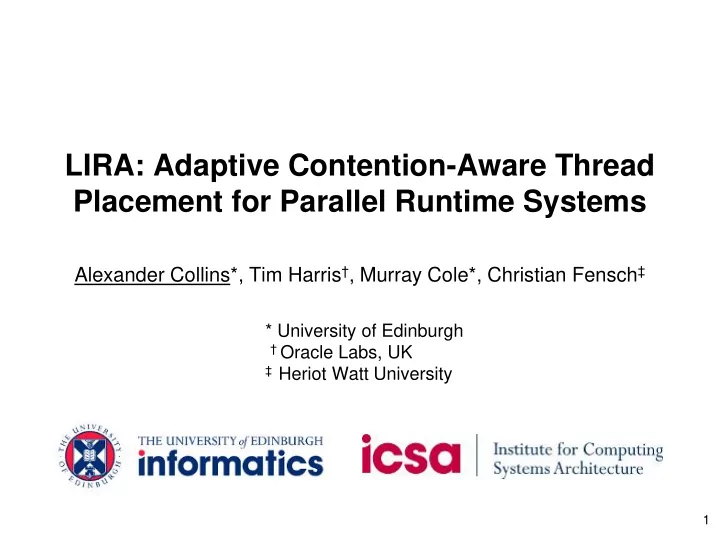

LIRA: Adaptive Contention-Aware Thread Placement for Parallel Runtime Systems Alexander Collins*, Tim Harris † , Murray Cole*, Christian Fensch ‡ * University of Edinburgh † Oracle Labs, UK ‡ Heriot Watt University 1
The Problem • Multi-socket machines common-place • Run multiple parallel programs • Co-location affects performance • Which programs should we co-locate? 2
3
The Problem • System workload is constantly changing • Best co-location changes • Need an online adaptive solution 4
Our Insight • Balance load instruction rate across sockets 5
Our Solution • Schedule programs to sockets • Maximise difference in load instruction rate (LIRA heuristic) • Built on top of Callisto [1] • Each program pins one thread to each core • One thread on each core is high priority • High priority thread runs unless it stalls [1] Callisto: Co-scheduling Parallel Runtime Systems, Harris et al. EuroSys ‘14 6
Our Solution 7
Our Solution 8
Our Solution 9
Our Solution 10
Our Solution 11
Our Solution 12
Our Solution 13
Our Solution 14
15
16
17
18
19
20
21
22
23
24
25
26
27
28
29
Evaluation • 11 benchmarks from SPEC OpenMP 2001 • 4 from GreenMarl project • 1 using CDDP (betweeness-centrality) • Dual-socket Xeon E5-2660 • 8 cores each (hyperthreading disabled) 30
Evaluation • Measure 32 combinations of four programs • ANTT and STP system performance metrics • Comparing: • Socket unaware Callisto • LIRA static tuning • LIRA adaptive tuning 31
Evaluation 32
Conclusions • Co-location affects performance • Adaptive online tuning is required • LIRA heuristic improves performance • More details in the paper 33
LIRA: Adaptive Contention-Aware Thread Placement for Parallel Runtime Systems Alexander Collins*, Tim Harris † , Murray Cole*, Christian Fensch ‡ * University of Edinburgh † Oracle Labs, UK ‡ Heriot Watt University 34
35
37
38
39
40
Recommend
More recommend